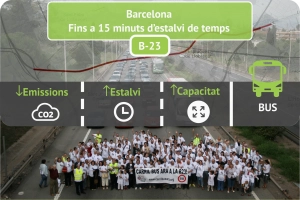Spain-based EPF member Associació per a la Promoció del Transport Públic (PTP) is celebrating a long-awaited step for passengers: a dedicated bus lane on the B-23 into Barcelona. PTP describes the achievement as the result of decades of proposals, alliances and public pressure, dating back to the “Manifest d’Esparreguera” in 2000 with Baix Llobregat municipalities.
The new bus lane runs for about 7 km between Sant Feliu de Llobregat and Avinguda Diagonal, built in the central median and without reducing general-traffic lanes until the Barcelona entry. PTP notes this pragmatic design reuses the existing carriageway section, an approach they had proposed.
What it means for passengers:
- Up to 15 minutes saved at peak for metropolitan buses, improving reliability;
- 30,000 hours saved annually for users (estimated €450,000 in value);
- Benefits extend to 600+ interurban buses per day, with 10–15% demand growth expected;
- Up to 1,200 t CO₂/year avoided through less congestion, better efficiency and modal shift.
 This milestone also caps a long civic effort. Back in 2007, PTP staged a demonstration to make the capacity case tangible: three buses versus 100 cars, a powerful, visual comparison carried out with public transport operators, citizens and volunteers alongside the authorities (watch PTP’s short video of the demonstration here).
This milestone also caps a long civic effort. Back in 2007, PTP staged a demonstration to make the capacity case tangible: three buses versus 100 cars, a powerful, visual comparison carried out with public transport operators, citizens and volunteers alongside the authorities (watch PTP’s short video of the demonstration here).
PTP underlines that sustained advocacy over more than two decades, from studies and formal submissions to public actions, was essential to getting here. They also flag next steps to ensure the full benefits are felt inside the city. This includes smooth connection to the Diagonal bus lane, continuous bus-priority along the entire corridor, better passenger information at key stops, and firm enforcement so the lane remains dedicated exclusively to buses.
EPF warmly congratulates PTP and the many partners involved, citizens, operators and local authorities, on a collective win that puts passengers first and advances sustainable mobility in the Barcelona metropolitan area.
👉 Read more here


 Stay informed!
Stay informed!